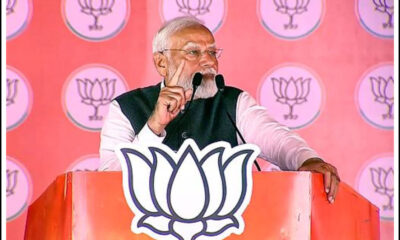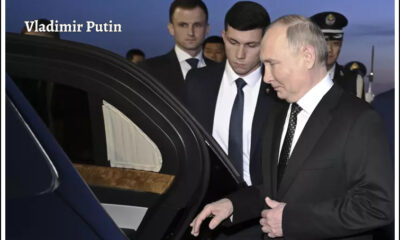Adani
Supreme Court Supports Adani Group’s Clean Chit From SEBI In Hindenburg Case, No SIT Probe
Published
5 months agoon

Hindenburg case: Chief Justice of India DY Chandrachud, together with Justices JB Pardiwala and Manoj Misra, delivered the verdict in the Supreme Court, stating that there is no justification for sending the case to a special investigative team
Delhi, New: The Supreme Court ruled on Wednesday that the capital markets regulator SEBI’s inquiry into the Hindenburg issue cannot be questioned based solely on the report of the OCCRP, an organization supported, among others, by billionaire George Soros. This ruling represents a significant victory for the Adani Group.
A Supreme Court panel led by Chief Justice of India DY Chandrachud and Justices JB Pardiwala and Manoj Misra delivered the decision, ruling that there was no justification for sending the matter to a special investigation team (SIT).
The US-based short seller Hindenburg Research’s allegations have been connected to 24 cases, of which 22 have been probed by the Securities and Exchange Board of India (SEBI). The remaining two cases were given three months by the Supreme Court for the SEBI to finish its probe.
The government and SEBI were also directed by the Supreme Court to investigate whether Hindenburg violated any regulations by shorting the market and to take appropriate measures.
The OCCRP report’s dependence is rejected, and a report from a third party organization that hasn’t been verified cannot be utilized as evidence. Chief Justice Chandrachud, pointing to the Organised Crime and Corruption Reporting Project (OCCRP), stated in the ruling that there were no grounds to shift the investigation in this case from SEBI.
The ruling was in line with the Supreme Court’s November 24 advice to attorney Prashant Bhushan that the Adani Group-focused OCCRP report and the Hindenburg claims should not be taken at face value.
“It is uninspiring to rely on newspaper articles and outside organizations to criticize the statutory regulator (SEBI). You can treat them like inputs. but not enough proof to call into question SEBI’s investigation,” the Supreme Court declared today.
“Before concluding, public interest jurisprudence was developed to provide access to ordinary citizens… petitions that lack adequate research and rely on unsubstantiated reports cannot be accepted,” the court stated.
Read also:-भारत की प्रथम महिला शिक्षिका सावित्री बाई फुले की जयंती पर किया पुष्पांजलि आयोजन
Lawyers Vishal Tiwari and ML Sharma, Congressman Jaya Thakur, and activist Anamika Jaiswal filed the petitions on the matter. The petitions contended that the Adani Group had artificially inflated the value of its shares, and that following the report released on January 24th, 2018, by short-seller Hindenburg Research, the shares of several group corporations had plummeted.
A “malicious combination of selective misinformation and concealed facts relating to baseless and discredited allegations to drive an ulterior motive” was how the Adani Group had described the report.
In its explanation for rejecting the request to move the investigation to a Special Investigation Team (SIT), the Supreme Court stated that such a move should only be made in extreme cases and that there must be a solid, rational basis for doing so.
The Supreme Court ruled that closing gaps for Indian investors is a crucial lesson from the Hindenburg controversy. It also directed the Center and SEBI to implement the committee’s recommendations in order to support investors.
Attorney General Tushar Mehta, representing SEBI, stated during the last session that the agency had finished investigating 22 of the 24 cases of alleged transactions and that it was awaiting information from foreign agencies regarding the other two.
In a report it filed in May of last year, a different committee that the Supreme Court had ordered to investigate India’s investor protection regulatory framework similarly gave the Adani Group the benefit of the doubt.
It had stated that neither the Adani Group’s price manipulation nor SEBI’s regulatory failures existed. The committee had stated that the company had taken the appropriate actions to reassure retail investors in the face of intense market turbulence after the release of the Hindenburg report.
The Adani group had described the Hindenburg report as a “selective and manipulative presentation of matters already in the public domain to create a false narrative” in its reaction.
“This is not merely an unwarranted attack on any specific company but a calculated attack on India, the independence, integrity and quality of Indian institutions, and the growth story and ambition of India,” the organization stated in a statement.
You may like
-


On the Citizenship Amendment Act (CAA), PM Narendra Modi challenges Congress and the SP
-


Shortly After Slovak PM’s Assassination, As Crowd Held Gunman
-


Vladimir Putin, the leader of Russia, makes a state visit to China as a symbol of the alliances’ solidarity
-


NASA: Bright, tiny, plant-like creatures discovered in the Celtic Sea
-


Earth’s North Pole is moving more quickly
-


Kiara Advani will make her Cannes Film Festival debut in 2024

